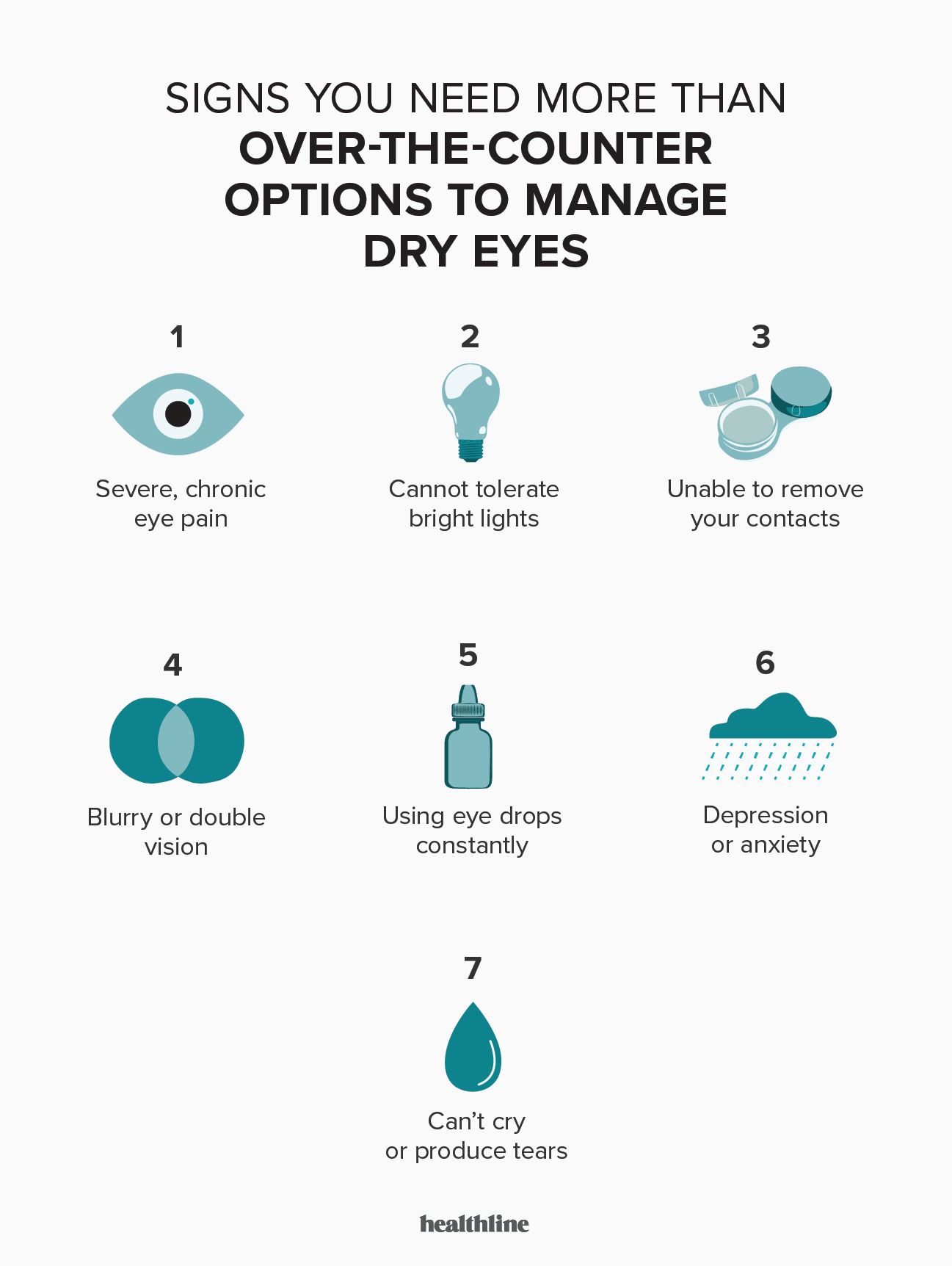Some signs that your current dry eye treatments aren’t working include chronic eye pain, light sensitivity, and blurriness, among others.
Dry eye affects nearly
The
- moisturizing your eye
- protecting your tear film
- reducing eye stress
Sometimes, however, OTC artificial tears may stop working or may not be enough to help treat your symptoms.
Keep reading to learn more about signs that your OTC medications aren’t working and when to speak with a healthcare professional.

Symptoms of dry eye may include:
- gritty, stinging, or burning sensation
- watery eyes
- red eyes
- itching
- dry, crusty eyelashes
It’s also possible to
If left untreated, dry eye symptoms may develop into a chronic condition that progressively worsens. This could lead to several complications,
- cornea damage or scarring
- conjunctivitis
- eye infections
- eye ulcerations
- vision loss
Severe dry eyes may not respond well to OTC medications like artificial tears. As such, a healthcare professional may recommend other options,
Sensitivity to light, also called photophobia, is a common symptom of dry eye that could be painful and impact your quality of life.
A small
Different types of light can trigger dry eye symptoms, including:
- fluorescent, flickering, or glaring lights
- electronic screens, such as televisions and computers
- sunlight
Research regarding treatment for photophobia caused by dry eye is
If you wear tinted glasses inside, a healthcare professional may recommend weaning away from these as they increase your eye’s sensitivity to light. However, wearing sunglasses outside may help with photophobia.
The
According to a
Your tear film
If your eyes become too dry while wearing your contact lenses, it may be difficult to remove them. Contact lenses need moisture to be comfortable, but OTC eyedrops may not be enough to keep your eyes lubricated.
A healthcare professional may recommend contact lenses designed specifically for dry eyes,
Temporary blurriness is another sign of chronic dry eye.
Blinking a few times or applying eye drops will usually get rid of blurriness.
However, if your blurry vision doesn’t improve with an OTC product, a healthcare professional will likely prescribe eye drops.
It’s important to get immediate medical attention if you experience sudden blurriness, wave-like flashes, or floaters in your vision. These may be signs of a retina detachment.
You may find that applying OTC eye drops throughout the day is an effective dry eye remedy.
However, if you feel like you need to constantly apply eye drops, you may require a different type of treatment.
A healthcare professional may recommend eye drops with no preservatives in them. They may also recommend eye ointments, which are thicker and may provide longer-lasting moisturization.
That said, it’s best to apply ointments before bed because they may cause temporary blurriness, according to the National Institute for Health and Care Excellence.
Chronic dry eye can affect you emotionally, which
If OTC remedies aren’t helping you manage your symptoms, it’s important to speak with a healthcare professional.
Treating dry eye may help
In severe cases of dry eye, you may
If OTC remedies don’t help increase the moisture in your eye or its ability to produce tears, speak with a healthcare professional. You may need a prescription eye drop to stimulate your tear glands and keep your eyes moist.
Can dry eyes cause pain in the eye?
Yes, dry eyes can cause pain in the eye. This may feel like a burning sensation, sharp pain, or as if something is in your eye.
How do you treat dry eyes?
Treatment for dry eyes will depend on the underlying cause and severity of your symptoms. Treatment options may include OTC or prescription artificial tears, tear duct plugs, or minor surgery.
Can dry eyes go away by themselves?
Temporary dry eyes may go away on their own. For example, sheltering from strong winds may help dry eyes if winds are the problem, or stopping to take medications that are causing dry eye may help. That said, chronic dry eyes usually require long-term treatment.
What is the best medication for dry eyes?
According to the American Academy of Ophthalmology, five medications are approved by the Food and Drug Administration for dry eye treatment: tyrvana (Oyster Point), restasis (Allergan), cequa (Sun Ophthalmics), xiidra (Novartis), and eysuvis (Kala Pharmaceuticals).
Dry eyes may seem like a minor annoyance or problem. However, chronic dryness can progress and lead to complications like infections or damage to the surface of your eyes.
If your symptoms don’t improve after several weeks of trying OTC remedies, speak with a healthcare professional. They could provide a proper diagnosis and develop a treatment plan that’s right for you.
